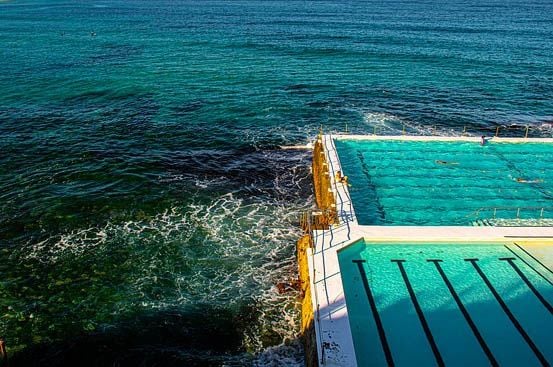
Fun fact: Saltwater crocodiles are the largest living reptiles in the world. They can grow up to 23 feet long and weigh over 2,000 pounds.
But we're not here to talk about crocodiles. We're here to talk about saltwater pools.
As fiberglass pool manufacturers who work with a network of installers across the country, we can confirm that saltwater pools are growing more and more popular every year.
While public opinion clearly supports installing or switching to a salt system, people still have a ton of questions.
Are saltwater pools effective? Can my dog swim in a saltwater pool? Are saltwater pools better than traditional chlorine pools? Can any pool be a saltwater pool?
We know because we hear these questions every day.
To help you decide if a salt system will work for your pool, we've answered the most frequently asked questions about saltwater pools and provided our personal opinion on whether they're better than chlorine pools.
Let's get started.
Saltwater Pools Questions and Answers

Are saltwater pools cheaper?
One of the myths about saltwater pools is that they cost more than traditional chlorine pools. Conversely, some people think that they are cheaper.
The reality is that saltwater pools and chlorine pools cost about the same amount over time. There are many benefits to having a saltwater pool instead of a chlorine pool, but cost isn't always one of them.
Read more: The Lowdown on Saltwater Pools vs. Chlorine Pools
Can any inground pool be a saltwater pool?
Yes. In our experience, we have seen vinyl liner, concrete, and fiberglass pools with salt systems. Does this mean that they are all optimal for saltwater chlorinators?
Not necessarily.
We've found that fiberglass pools work best with salt chlorine generators for several key reasons:
- The salt doesn't wear away at the surface of the pool like it often does with plaster
- There are no metal wall panels and therefore no risk of corrosion within the pool's structure
You can absolutely use a salt system on your concrete or vinyl pool, but we'd recommend steering clear of metal walls and keeping an eye on your pool's plaster surface.
Can an above ground pool be a saltwater pool?
Above ground pools can also be saltwater pools as long as the materials used to construct the pool are compatible with salt (resin and aluminum are fine).
Can you use an automatic pool cover with a saltwater pool?
While it might seem like it wouldn't be an issue to add an automatic pool cover to your saltwater swimming pool, you can encounter costly corrosion over time. Most automatic pool cover systems have a lot of metal parts, and these parts can easily rust and corrode with exposure to salt.
Can you use metal handrails and ladders in a saltwater pool?
While we're on the subject of metal, metal handrails and ladders can also corrode faster when installed in a salt pool. In particular, metals like galvanized steel don't do too well in saltwater.
The biggest problems will likely be with the anchors. Once those become corroded, it will be challenging to remove and replace any installed handrails or ladders. Not ideal.
Pro tip: if you want a salt system in your pool and plan to have a ladder or handrail, be sure to use brass anchors.
Read more: Top 5 Salt Water Chlorine Generator Problems
Can a pool with a spa be a saltwater pool?
Yes! If you have a pool with a built-in spa or have installed a spa with a spillway next to your pool, you can still use a salt system. In fact, many people choose salt chlorinators for their spas and hot tubs, even if they don't have a swimming pool.
Is a saltwater pool good for your skin?
Many have reported that saltwater pools feel silkier than chlorine pools and don't leave your skin itchy or uncomfortable. That is a BIG plus if you intend to spend a lot of time in the water.
Do saltwater pools cause eye irritation?
Saltwater pools are also known to be much gentler on eyes, and spending long periods in the pool shouldn't result in pain, itchiness, or redness in the eyes, unlike chlorine.
Bonus: Saltwater pools are also gentler on hair, which is another major benefit for frequent swimmers.
Is a saltwater pool bad for dogs?
If you are concerned about your pet swimming in a salt pool, fear not. The water in a saltwater pool is actually softer on fur and eyes and should be more comfortable for your furry friend.
Pets can also use traditional chlorine pools, but they might experience some redness or itchiness (like many humans) if they spend too much time in the water.
Read more: Swimming Pools and Dogs: A Few Points to Ponder
Are saltwater pools safe?
Saltwater pools are safe in that they can effectively kill or inactivate bacteria and viruses, just like a chlorine pool. They also eliminate the need to handle and store strong chemicals in or around your home.
Here's one thing we want to caution you about: You need to be mindful of your pool's chlorine levels. It's not as noticeable when the chlorine levels in a salt pool get too high, so make sure to regularly test the water.
What are the benefits of a saltwater pool?
Saltwater pools come with many benefits as long as your pool and pool accessories are compatible with salt (i.e. no metal, automatic pool covers, or plaster).
Overall, these are some of the top benefits of owning a saltwater pool:
- The water is silky and clear
- The annual cost is often lower
- The chlorine smell is not as strong
- You don't have to handle or store chlorine
- The water is gentler on eyes, skin, and hair for humans and pets
- Many report maintenance being easier
Important Note: If you're new to salt systems, we want to make it clear once again that a salt pool is not a chlorine-free pool. Salt-system generators actually convert the salt into chlorine to sanitize the water, but it is still typically much milder than a pool that uses chlorine liquid, tablets, or an automatic chlorinator. You can learn more about how salt chlorine generators work here.
Are saltwater pools better?
Ultimately, people want to know what we think about saltwater pools and whether we believe they are superior to traditional chlorine pools. While we do love and often recommend salt systems to interested customers, the fact is that saltwater pools come with their share of drawbacks.
Some of the main saltwater pool drawbacks that people have reported include:
- hard on metal pool parts and accessories
- can cause staining on pool plaster
- can wear away at pool plaster quickly
- will be necessary to replace the generator cell and control board regularly
Having been in the pool industry as long as we have, we know there is no such thing as a one size fits all pool. If you like the idea of swimming in a salt pool or plan to spend long hours in the pool and don't want to deal with the side effects of harsh chemicals, a saltwater pool might be an excellent option for you. Just keep a close eye on any metal parts in your accessories and test your chlorine levels often to make sure that they don't get too high.
Do you have a saltwater pool, or are you interested in converting to a salt system? Let us know your thoughts in the comments!
At River Pools, we manufacture world-class fiberglass pools for customers across North America. If you'd like to explore your fiberglass pool options, you can browse our pool models, visit our learning center, or request custom pricing using the button below. (Remember, fiberglass pools can be installed inground, above ground, semi-inground, and with a vanishing edge.)
If you're looking for more information on fiberglass pool pricing, you can try out our pool pricing calculator tool or download our free ebook below. Happy swimming!
Up Next:
Salt Water Pools: What Type of Salt Should I Use and Why?
Inground Saltwater Pool Cost: Salt, Cells, Generators, and More
Swimming Pool Sanitizers: The 7 Best Options to Consider (Pros/Cons)
Editor's Note: This article was originally written by Marcus Sheridan on July 2, 2020. Any opinions expressed are those of the author. Any prices referenced were based on information that was readily available at the time.
River Pools is a brand of inground fiberglass pools produced in a manufacturing facility in Fortville, IN. While our expertise is in manufacturing fiberglass pools, we have access to a network of installers with expertise relating to project design, installation, and pool service. We often tap into this knowledge base and share information freely with homeowners, just like you, considering installing a swimming pool in your backyard.
Marcus Sheridan is a co-founder of River Pools® Virginia and a leading voice in the fiberglass pool industry, known nationally for his commitment to educating homeowners about inground pools. Over the past two decades, Marcus has helped thousands of families confidently navigate the pool buying process with transparency and trust. His straightforward, educational approach has helped make River Pools a go-to resource for fiberglass pool buyers across the country. When he’s not writing or speaking about pools, Marcus helps businesses embrace honest communication to better serve their customers.


